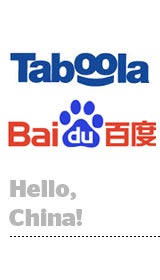 Taboola is paving the way to enter the Chinese market.
Taboola is paving the way to enter the Chinese market.
On Monday, it revealed it had received a multimillion-dollar investment from Chinese search provider Baidu. Baidu does not name the level of investment unless SEC rules require it.
“The goal behind the investment is to work together on launching native advertising in China,” Taboola CEO Adam Singolda said. He will go to Beijing in the next few weeks to see how Taboola and Baidu can collaborate in China
“We believe that the technology translates very well,” said Peter Fang, Baidu’s senior director of corporate development. He declined to outline specific plans.
Taboola’s technology is designed to proactively push relevant content to online audiences – a sort of “reverse search.” That functionality, as well as Taboola’s focus on performance, attracted Baidu, Singolda said.
Advertisers can “attach an ROI to storytelling,” optimizing content to pixels like Facebook shares or newsletter signups, he said.
The Israeli company has expanded internationally either by building offices and hiring local talent, as it did with the United States (where it is now headquartered), the United Kingdom, India and France, or through partnerships.
Taboola entered the Japanese market through a partnership with Yahoo Japan. Singolda pointed out that Yahoo Japan invested in Taboola after selecting it as its native advertising partner, a vote of approval for the product.
Taboola’s biggest competitor, Outbrain, also has international operations. It launched almost two years ago in Brazil and then Germany, two markets where Taboola does not have a significant presence.
Baidu’s investment comes just after Taboola raised $117 million in February. Singolda said conversations with Baidu started after that round was already complete.
Baidu has made other investments outside the United States, often focused on mobile: Japanese mobile emoji app Simeji and Finnish indoor mapping company IndoorAtlas. It’s also invested in Uber, Israeli startup Tonara (sheet music app) and Pixellot (video startup).
Although the investment will focus on finding opportunities for Taboola technology in China, Baidu plans to expand outside China as well. The MIT Technology Review wrote last year that the company plans to earn half its revenue outside China by 2020.
As Taboola starts to look at setting up operations in China, it’s also looking to other Asian markets, including India, which have huge populations and relatively low Internet penetration.
“Asia is ready for Internet tech advertising companies,” Singolda said, “and there are amazing companies ready to partner.”













